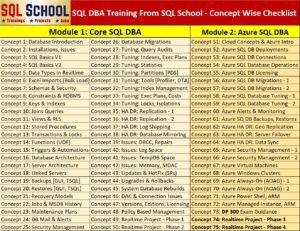SQL Database Administrator
Today’s world is driven by data, every organization relies on secure, efficient, and scalable databases. A SQL Database Administrator (SQL DBA) plays a critical role in ensuring that business applications run smoothly, data remains safe, and performance is optimized. Whether you’re an aspiring IT professional or an experienced developer looking to upskill, SQL DBA expertise is among the most in-demand skills in 2025.
Who is a SQL Database Administrator?
A SQL Database Administrator ( SQL DBA ) is responsible for installing, configuring, securing, and maintaining Microsoft SQL Server databases. They ensure high availability, data integrity, performance tuning, and regular backups for disaster recovery of the servers. They work with both on-premise and cloud environments like Azure to handle large-scale enterprise data systems. With growing demand in industries like finance, healthcare, and IT, SQL DBAs play a crucial role in data-driven decision-making.
Key Responsibilities of SQL Database Administrator:
1. Database Installation & Configuration:
A SQL DBA is responsible for installing SQL Server instances across environments, from development to production. They ensure proper configuration of SQL Server Management Studio (SSMS). They also ensure setting up system databases and user databases and run optimally, support business workloads, and remain scalable.
2. Database Security & Access Management:
Data security is a top priority for every organization. SQL DBAs implement role-based security by creating and managing user logins and permissions, setting up encryption for data at rest and in transit, monitoring and auditing to protect sensitive information from unauthorized access or breaches.
3. Backup & Recovery Planning:
A core responsibility of every SQL DBA is ensuring data safety through backups and recovery strategies. They schedule regular full, differential, and transaction log backupsDBAs must prepare for worst-case scenarios like hardware failure, cyber-attacks, or human errors with restore drills and Implementing disaster recovery solutions like Log Shipping, Mirroring, or Always-On Availability Groups.
4. Performance Monitoring & Tuning
Slow queries can impact application performance. SQL DBAs act as performance guardians by continuously monitoring and optimizing databases. They create index and manage it performance. They do query optimization using execution plans. Monitoring CPU, memory, and I/O bottlenecks using tools like SQL Profiler and Extended Events.
5. High Availability (HA) & Disaster Recovery (DR)
Business applications must run 24/7 without downtime. SQL DBAs design and manage HA/DR solutions to ensure business continuity. Availability Groups ensure high availability by keeping multiple database replicas synchronized with automatic failover. Failover Clustering provides server-level protection, allowing another node to take over instantly if one fails. Replication and Log Shipping distribute data across servers—replication in real time, log shipping through continuous backups. Cloud-based failover with Azure SQL Managed Instances offers reliable disaster recovery and minimal downtime using Microsoft’s cloud.
6. Upgrades, Patching & Maintenance
SQL Server versions change rapidly, and it is the responsibility of a SQL DBA to ensure that the organization always runs on supported and updated versions. This helps minimize risks, maintain security, and achieve optimal performance. The role involves applying security patches and cumulative updates on time, migrating databases to the latest SQL Server versions when required, and performing routine health checks along with maintenance plans to keep the systems running smoothly.
7. Automation & Scripting
Automation & Scripting is a key responsibility for modern DBAs, as it helps reduce manual effort, save time, and minimize errors. By leveraging T-SQL, PowerShell, and Python, DBAs can script and automate essential tasks such as database backups, index maintenance jobs, and performance monitoring alerts, ensuring smoother and more efficient database operations.
8. Cloud Database Administration
With the shift to the cloud, DBAs now manage hybrid and cloud-native databases. SQL DBAs must understand platforms like Azure SQL, AWS RDS, and Google Cloud SQL to manage modern infrastructures.

Become a Certified SQL Server DBA – From Basics to Expert-Level Administration!
Join SQL School – India’s most trusted destination for real-time SQL DBA training with cloud integration and hands-on labs.
✅ Learn SQL Server Administration (2016–2022)
✅ Master Backup, Recovery, Security, Jobs & Maintenance Plans
✅ Real-Time Practice with Always On, Replication & Azure Integration
✅ 100% Practical & Project-Based Training
✅ Interview Prep + Certification Guidance
📞 Call now at +91 9666640801 or visit 👉 SQL School for a FREE Live Demo Session!
SQL School – Your Real-Time Gateway to Database Administration Mastery.
